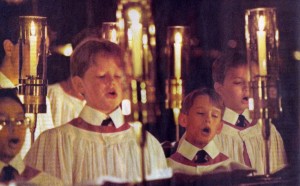A Service of Nine Lessons
and Christmas Carols
The
format of the Service of Nine Lessons and Christmas
Carols sung every year in All Saints church follows
closely the format of the service first offered in King’s
College,
The
broadcast of the Festival of Nine Lessons and Carols
from the chapel of King’s College Cambridge seems
almost as ingrained in our traditions of Christmas as
Santa Claus and the turkey. So it’s no surprise to
discover that the service is actually a relatively recent
phenomenon – it only dates back to 1918 with radio
transmission starting in 1928.
Nor has
it been an unchanging ritual, as a fascinating CD
released in November 2005 reminds us. On Christmas Day:
New Carols from King’s contains 22 of the carols
commissioned for the service by Stephen Cleobury since he
arrived in 1982 as director of music.
This year’s
new carol will be a setting of Away in a Manger by
John Taverner; something by John Adams is lined up for
the future. With compositions by King’s graduates
Thomas Adès and Judith Weir, as well as major names such
as Harrison Birtwistle and Arvo Pärt, already in the
bag, King’s can fairly claim to be bucking the
wretched decline in the quality of church music.

The
commissions are very much to the credit of Cleobury, only
the fourth director of music at King’s since 1929.
He isn’t a radical, he claims, and he arrived with
the modest intention of preserving “the virtues if
choral discipline”. But inevitably over the decades
he has moulded a change in style, and the choir no longer
sounds as it did under the regime of his predecessors.
“I
suppose I’ve developed a more open, natural and less
pure sound” Cleobury explains. The almost genteel
refinement that one notices in recordings of the choir
under Boris Ord (in charge from 1929-1957) has come
closer the to the freer, more abrasive tone cultivated in
the ‘50s and ‘60s by George Malcolm at
Westminster Cathedral and George Guest at St. John’s
Cambridge, in imitation of the European boys’ choirs
of Montserrat and Vienna.
More
change is on the way, thinks Cleobury, as the musical
education of the singers who enter the choir changes.
“They listen to a far wider range of music than my
generation did, and it’s marvellous that ‘classical’
is no longer isolated in its own little box. But the
standard of sight reading has gone down, and it troubles
me that you can now do A-level music without studying
harmony and counterpoint.”
Cleobury
also points out that “the number of candidates has
gone down by about half over the last years - we now have
about twenty applicants for four or five places. I put
this down to broader trends – less church-going, the
disappearance of music from so many primary schools.
Fortunately, the standard of the people we see remains
very high, and because of the reputation of King’s,
we’re not struggling or compromising in the way that
some other boys’ choirs are.” There is no
question of admitting girls at present.
The King’s,
choir has probably produced as many first-rate classical
musicians over the last 30 years as any of our
conservatoires (Gerald Finley, Mark Padmore and Andrew
Kennedy among them) but Cleobury is adamant that “we’re
not just a professional training-ground. It’s
equally important that we feed into our great tradition
of amateur music-making.”
He doesn’t
want the choir to measured by its commercial success
either – “it’s what we do day-to-day in
the chapel that really counts” – but it is
clearly gratifying that King’s remains “brand
leader” and has just signed a new five-year contract
with EMI Classics. It continues to tour out of term-time,
and has recently performed across the U.S. Europe and the
For the
senior choral scholars, the travel makes their parallel
lives as university undergraduates extremely taxing, but
they seem a happy team, conscious of being an elite and
grateful for the opportunities; about half of them will
make classical music their career.
The
junior choristers all boarding pupils at the prep school
attached to King’s, take it in their stride,
expressing certain impatience with Renaissance music (“too
repetitive”) and preferring the grander emotional
range of Elgar, Parry and Walton, though “people
like Bach are good too”.
As well
as the daily routine of choir practice, they all have
individual singing lessons designed to groom them in the
rudiments of god technique - deep breathing supporting
diaphragm, keeping your tongue forward and your mouth
open in a “hot potatoes” position. They also
have to adjust to the chapel’s acoustics – the
echo resonates for between four and seven seconds,
according to frequency ranges.
Although
the choir has been much recorded in since the 1960s,
evidence of its earlier work is sadly scarce, not least
because the BBC has lost or destroyed most its broadcast.
So the emergence of a cache of tapes from 1956-1959,
recently donated to the British: Library Sound Archive,
is of great historical importance.
These
were made secretly on a Grundig reel-to-reel machine by a
King’s undergraduate, Roger Martin, in conspiracy
with the choral scholar Brian Head, and although the
sound is very crude, they chart the choir’s
transformation fro the strict and even prissy elegance
nurtured by Boris Ord to the more expansive approach of
David Willcocks (1957-1973).
One track
and in particular stands out: the boy soprano Richard
White singing Ihr haht nun Traurigkeit, from
Brahms’s German Requiem, in 1956. It
encapsulates in one achingly sweet and seraphically pure
treble the unique magic of King’s.
Rupert
Christiansen.
Daily
Telegraph
Reproduced
by kind permission of the Daily Telegraph.